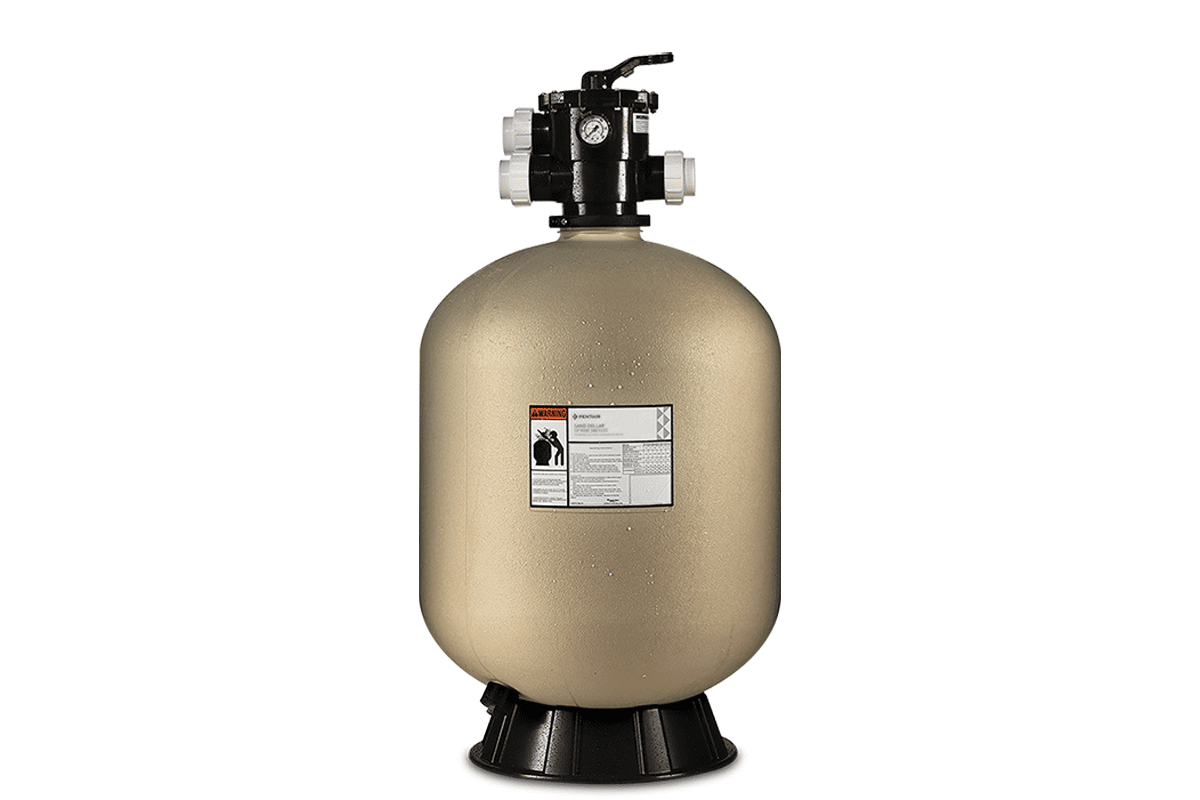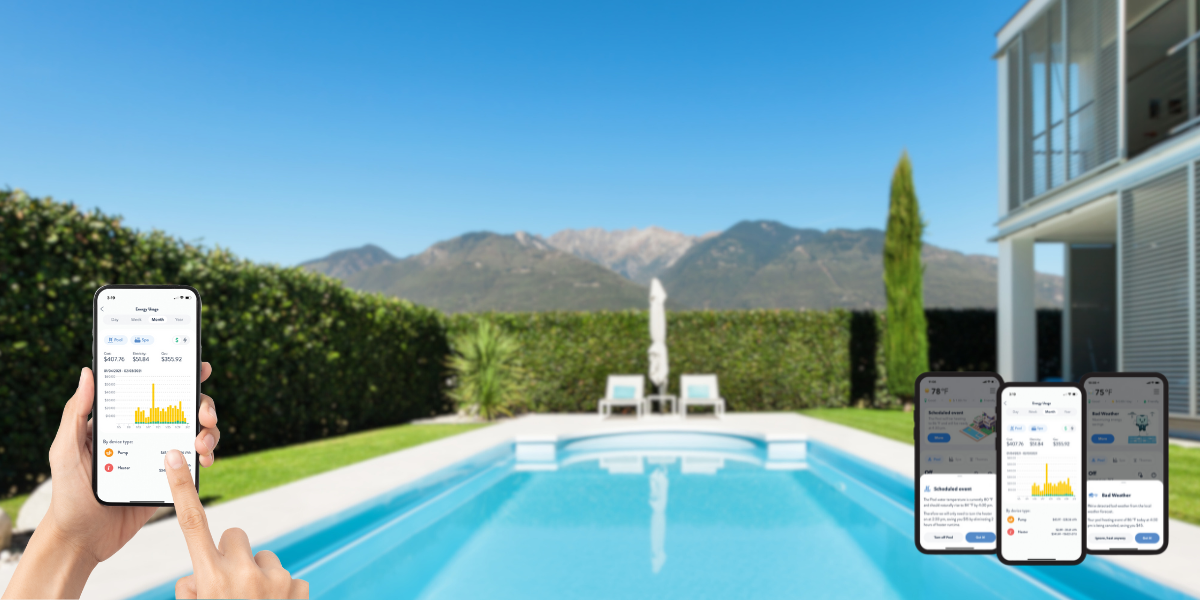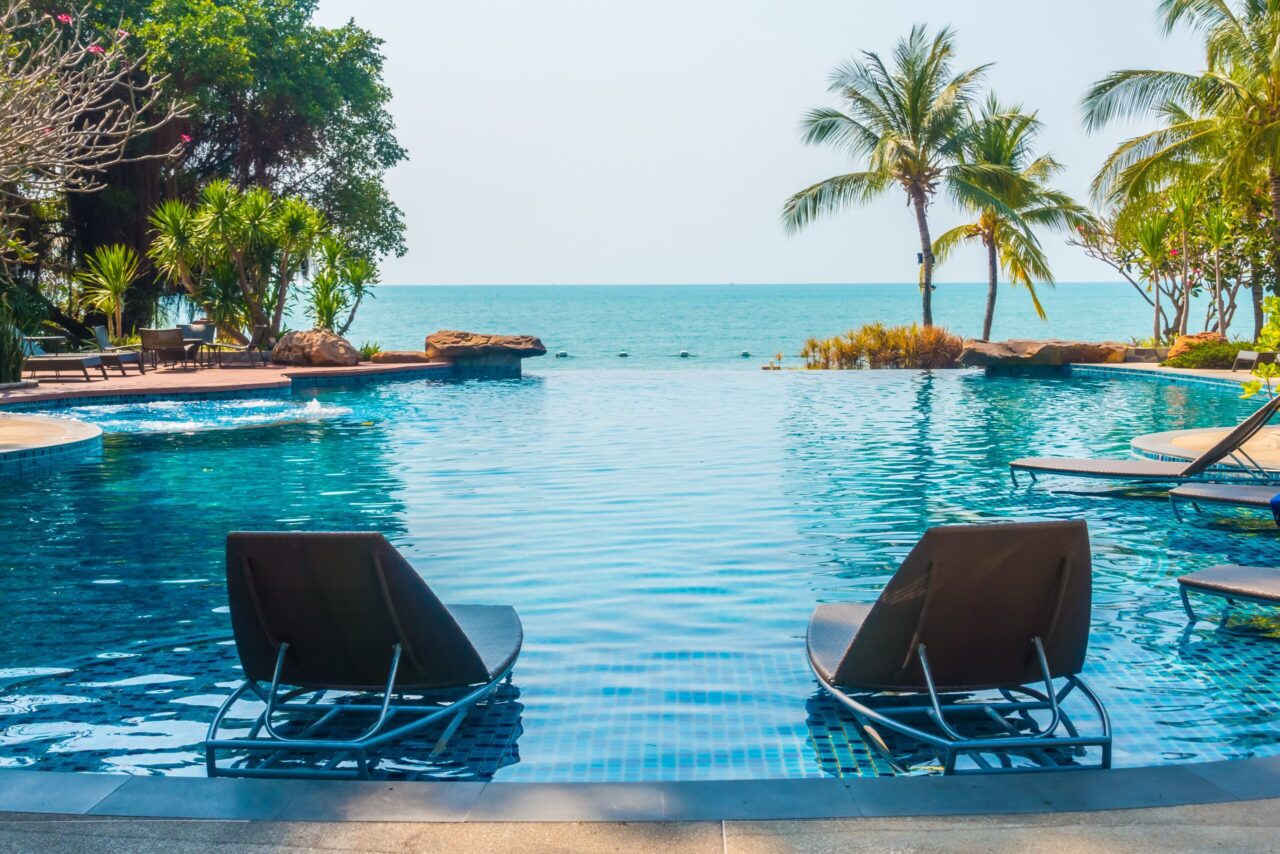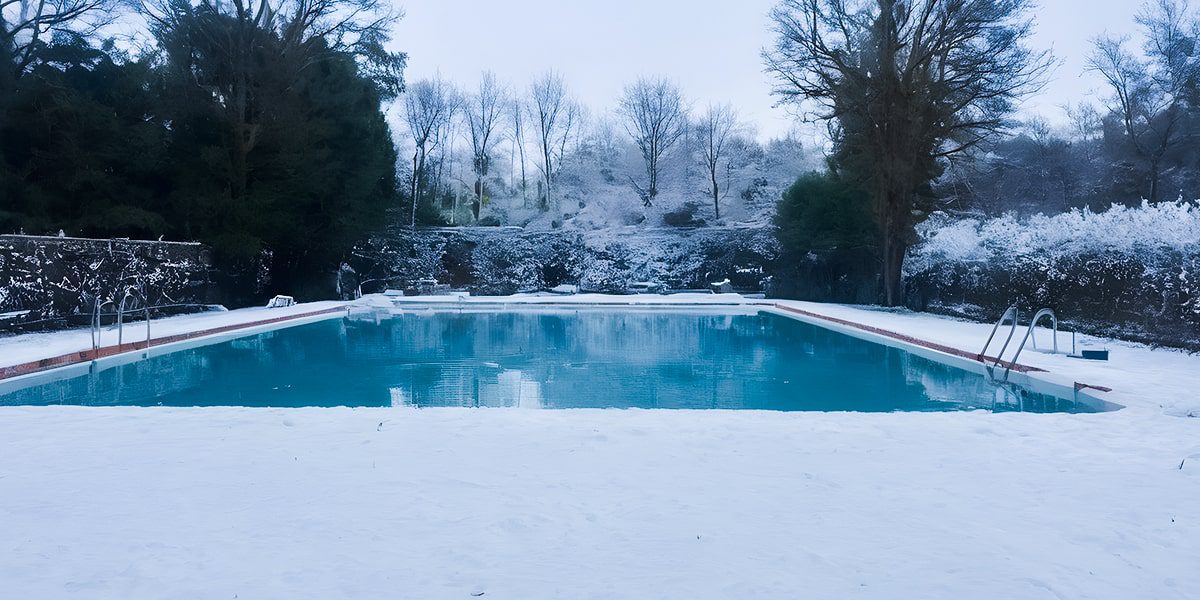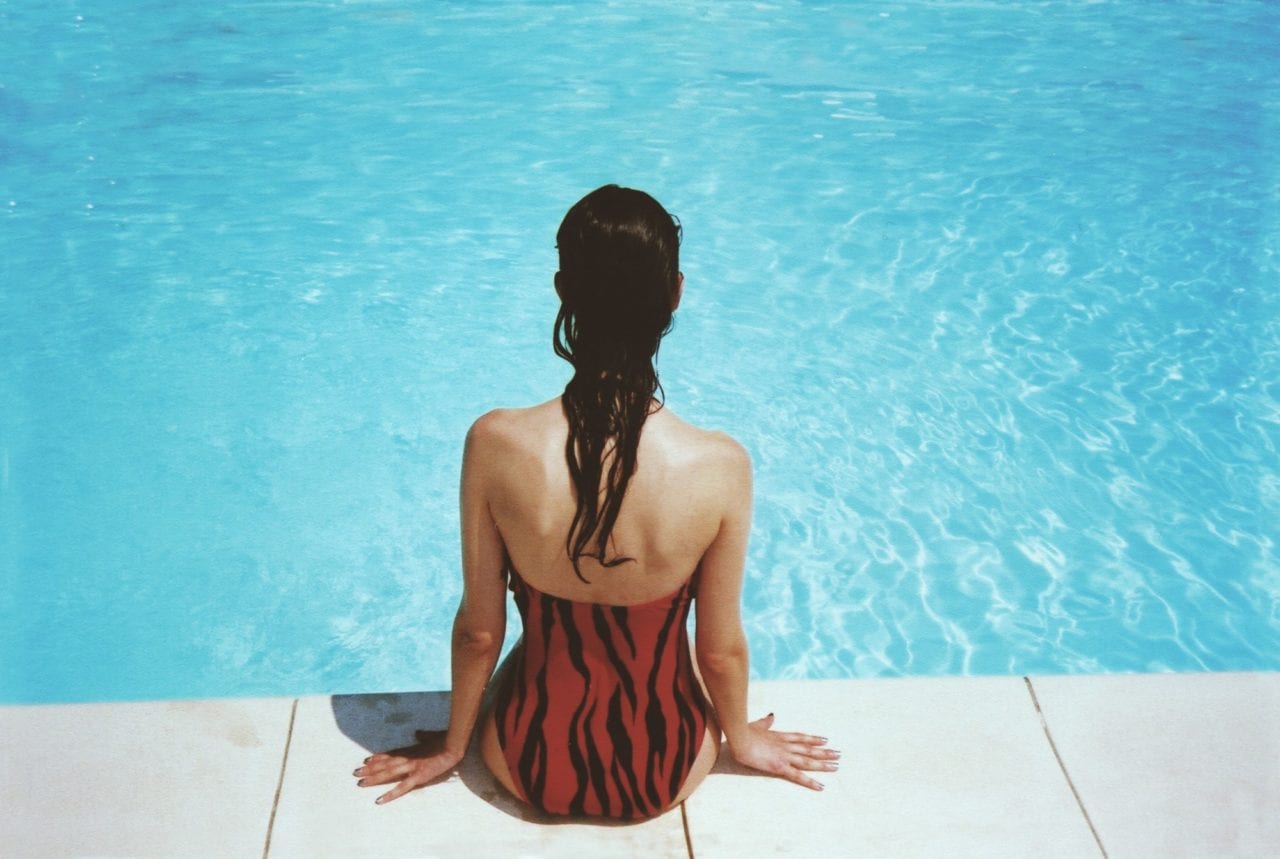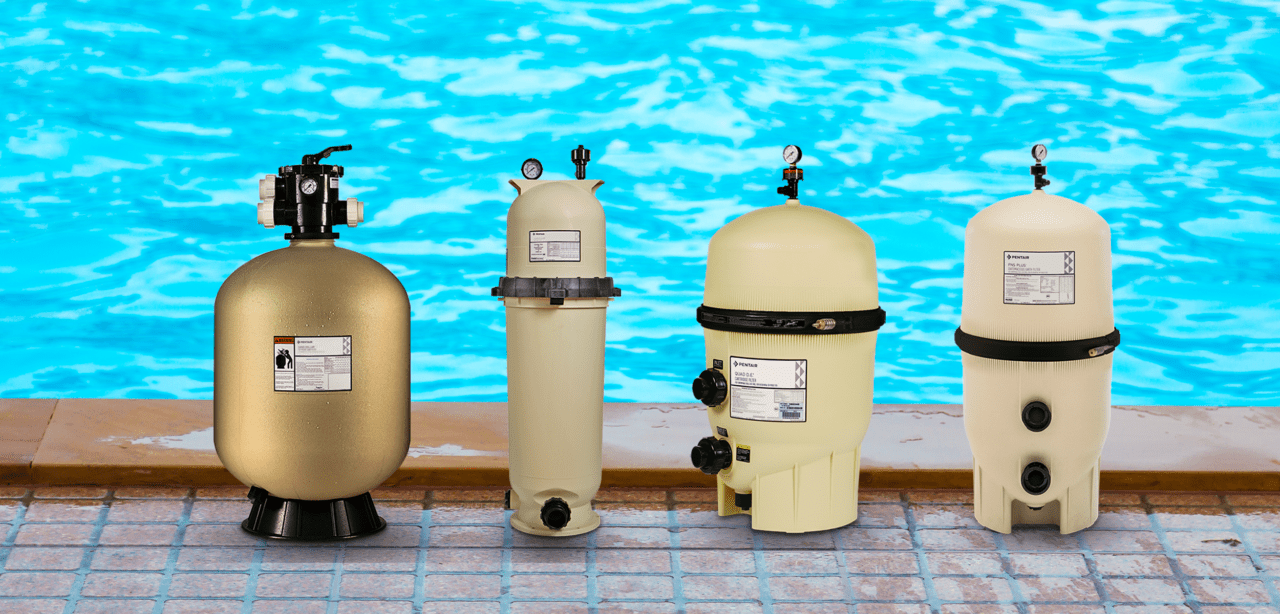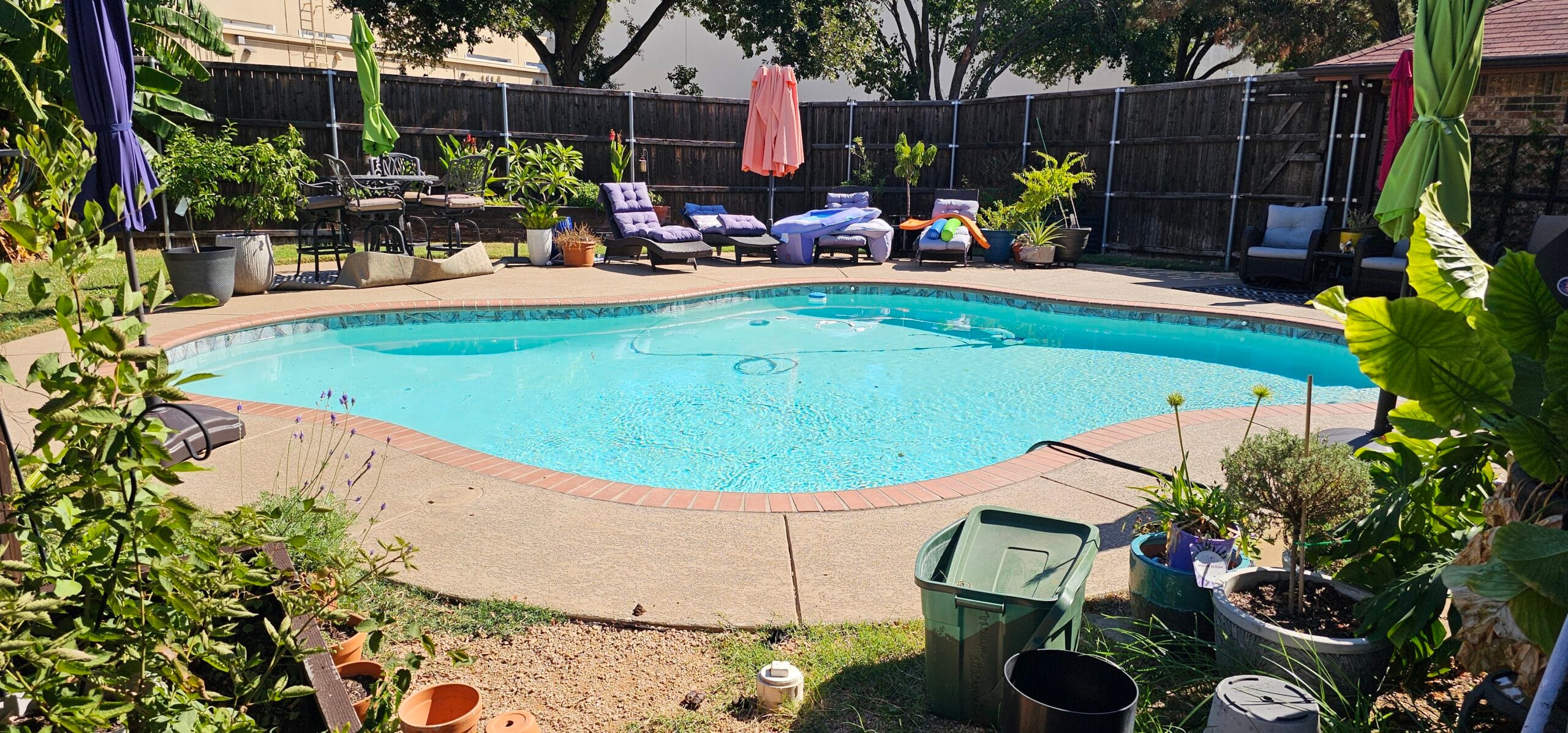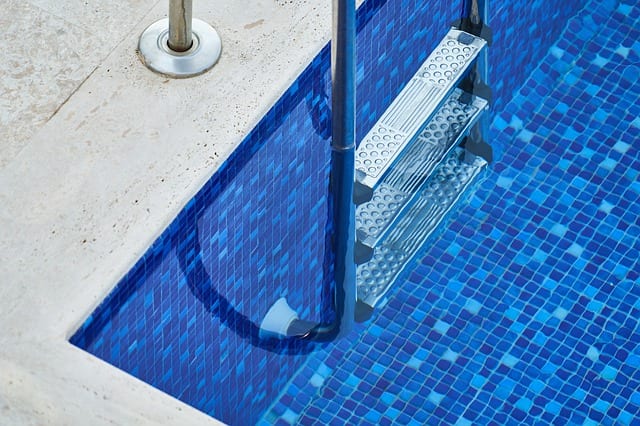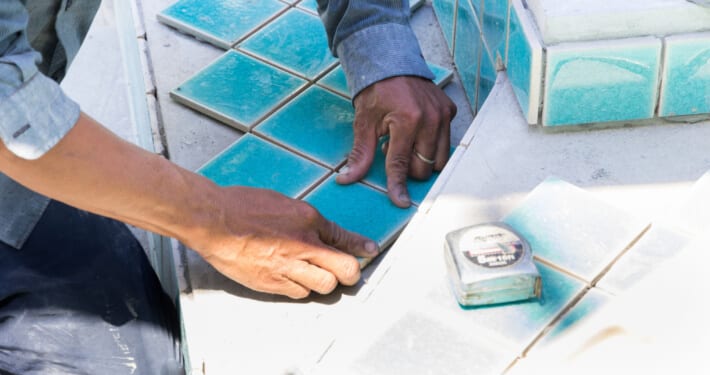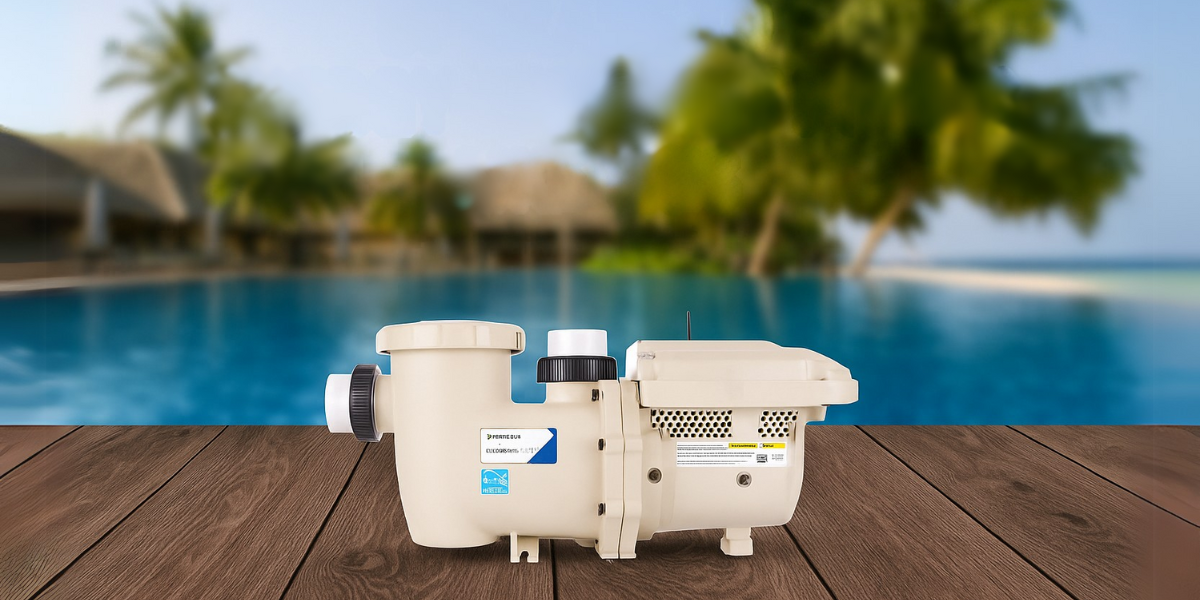A sparkling pool is the perfect focal point of a beautiful and welcoming outdoor space. The reliable pool filter is responsible for maintaining and achieving ideal water quality. In this comprehensive guide, we’ll explore the different types of pool filters, and the crucial role they play in pool maintenance. From the classic sand filters to the precision of DE filters and the efficiency of cartridge filters, we’ll unravel the secrets to choosing the right filter for your oasis.
Jump to
- What is a Pool Filter?
- The Purpose of a Pool Filter
- The Importance of Pool Filtration
- Choosing the Right Filter for Pool Maintenance
- Different Types of Pool Filters
- Pool Cartridge Filters:
- Hybrid Pool Filters
- Which Type of Filter Is Recommended?
- Common Mistakes to Avoid When Choosing a Pool Filter
- Leave the Cleaning to the Experts
- Pool Filter FAQ Section
What is a Pool Filter?
A pool filter is an essential component of any swimming pool system, tasked with the vital role of maintaining water cleanliness and clarity. Acting as the first line of defense against impurities, debris, and contaminants, pool filters play a crucial role in ensuring that the water remains safe and inviting for swimming.
The Purpose of a Pool Filter
A pool filter serves as a crucial device for the pool , essential for maintaining water quality and preserving the overall health and aesthetics of a swimming pool. By efficiently trapping particles, from visible debris to finer dirt, it prevents cloudiness and promotes a clear water appearance. Moreover, it acts as a barrier against algae growth, controls harmful microorganisms, and ensures uniform distribution of pool chemicals. Facilitating water circulation, the filter contributes to a comfortable and enjoyable swimming experience while extending the lifespan of other pool equipment. In essence, a pool filter is indispensable for a safe, clean, and inviting pool environment.
The Importance of Pool Filtration
Effective pool filtration is of paramount importance to ensure the water remains free from impurities and contaminants, maintaining a safe and inviting swimming environment. A well-functioning pool filter plays a crucial role in trapping debris, dirt, leaves, and other particles that find their way into the water. By preventing these contaminants from circulating in the pool, the filter promotes water clarity and prevents the formation of algae. This not only enhances the aesthetic appeal of the pool but also contributes to the health and safety of swimmers. Proper pool filtration is a cornerstone of routine maintenance, ensuring that the water stays crystal clear and enjoyable for all.
Choosing the Right Filter for Pool Maintenance
Choosing the right pool filter is vital for effective maintenance. Factors like pool size, debris type, and maintenance preferences play a role. Sand filters are reliable, ideal for larger pools with minimal upkeep. DE filters offer precision filtration for exceptionally clean water. Cartridge filters are energy-efficient and easy to maintain, suitable for smaller pools. Assessing these options based on pool specifics ensures optimal performance.
Different Types of Pool Filters
Sand Filters: The Classic Choice
How Sand Filters Work:
Sand filters operate based on a straightforward principle. The filter contains a bed of sand through which pool water is circulated. As water passes through the sand, impurities such as dirt and debris are trapped, leaving behind clean water. This mechanical filtration process effectively removes particles and ensures the water’s clarity and safety. The simplicity of this mechanism contributes to the widespread use of sand filters in pool systems.
How to clean Sand Filters
You’ll know it’s time to clean your sand filter by checking its pressure gauge. You’ll want to check it initially, and then clean it once the pressure rises 8-10 psi. To clean it, you’ll perform a backwash, turning off the pump, attaching its backwash hose, and turning the pump’s valve setting to “backwash.” Then, turn on the pump and let it run, watching as the water flows through it.
It’ll start out clear, but you’ll notice it starts to get darker as the debris washes out. Once it begins to run clear again, you can turn off the pump and change the valve setting to “rinse,” allowing it to run again for about a minute.
Finally, you can reset the pump to its normal setting and you’re all done.
Maintenance Tips for Sand Filters:
- Regularly backwash the filter to eliminate accumulated debris and maintain efficiency.
- Inspect and replace the sand every 5-7 years to ensure optimal filtration performance.
Pros and Cons of having Sand Filters
| Pros | Cons |
|---|---|
| An affordable start-up cost | less effective in collecting small particles |
| Low maintenance requirements | Backwashing uses a large volume of water |
| Ideal for large swimming pools | Needs Space |
DE (Diatomaceous Earth) Filters:
How DE Filters works:
DE filters employ diatomaceous earth, a fine and porous powder, as the filtration medium. This powder coats a series of grids or screens within the filter. As pool water passes through these coated surfaces, the diatomaceous earth captures and traps particles, ranging from small debris to microscopic impurities. This process results in exceptionally clear and clean water.
How to clean DE Filters
Again, you’ll know it’s time to clean your DE filter once you see the pressure gauge rises by 8-10 psi above normal. DE filters also require backwashing to be cleaned.
Simply turn off the filter and switch the valve to the “backwash” position. Once the water flows through as clear, you can replace the valve back to its normal position.
Then, you’ll need to remove the DE filter and rinse it off with a hose to remove the DE powder. Once you’ve done that, you can put the filter back in and refill the pump with new DE powder and turn the pump back on.
Guidelines for Maintaining DE Filters:
- Regularly backwash the filter to remove accumulated debris and maintain optimal filtration efficiency.
- Add fresh diatomaceous earth to the filter following the manufacturer’s guidelines.
| Pros | Cons |
|---|---|
| Best filtering for tiny particles | Higher starting price |
| Less regular backwashing | Diatomaceous earth needs to be handled carefully |
Pool Cartridge Filters:
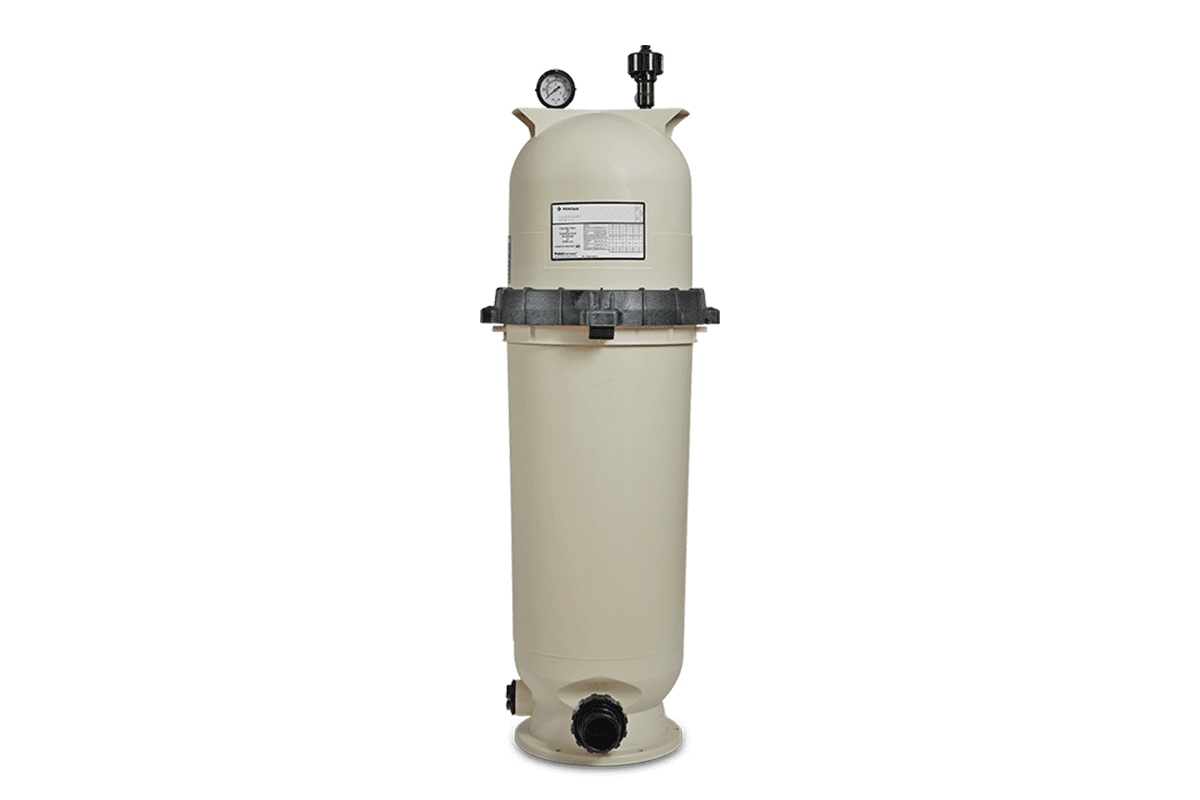
Cartridge Filter Functionality:
Cartridge filters operate by using a pleated fabric cartridge as the filtration medium. As pool water passes through this cartridge, impurities are trapped, providing an effective balance between particle filtration and water flow. The pleated design increases the filter surface area, enhancing its capacity to capture debris.
How to clean Cartridge Filters
Similar to the sand filter, you’ll know it’s time to clean your cartridge filter by checking the pressure gauge and seeing that it’s risen 8-10 psi.
You don’t have to backwash a cartridge filter. Instead, you just need to turn off the filter, remove the cartridge, and spray it down with a hose to clean it. If your filter is very dirty, you might also consider spraying it with a pool filter cleaning solution.
When you’re done, just put the cartridge back in the filter and turn it back on.
Care and Maintenance of Cartridge Filters:
- Regularly clean cartridges by hosing off debris to maintain optimal filtration efficiency.
- Periodically soak cartridges in a filter cleaner to remove stubborn contaminants and extend their lifespan.
Pros and Cons of Cartridge Filters
| Pros | Cons |
|---|---|
| Filtration of smaller particles | Higher starting price |
| Low maintenance and water efficiency | Cartridges are likely to be changed frequently |
Hybrid Pool Filters

How Hybrid Filter works:
Hybrid filters utilize a combination of filtration media, often integrating features from sand, DE, and cartridge filters. The hybrid design aims to capitalize on the strengths of each type, providing a versatile and efficient solution for maintaining pool water quality. The specific mechanics may vary based on the hybrid model, with some incorporating multiple stages of filtration for comprehensive cleaning. Regular maintenance is crucial to ensure optimal performance.
Pros and Cons of Hybrid Pool Filters
| Pros | Cons |
|---|---|
| Flexibility for different pool requirements | Higher starting price |
| Increased efficiency of filtration | Need more complex upkeep |
Finding it too complex to clean your pool? Simplify your life, Hire us for professional pool filter cleaning services! Let our experts take care of the maintenance
Which Type of Filter Is Recommended?
The recommended type of filter is dependent on a number of factors, including the size of the pool, the owner’s maintenance habits, and budget. Sand filters are common and cheap. Cartridge filters are more efficient than DE filters, which improve efficiency. Consult with a professional to get the best types of filters for your pool.
Common Mistakes to Avoid When Choosing a Pool Filter
When deciding on a pool filter, steer clear of these common mistakes to guarantee the ideal choice for your pool:
- Ignoring Pool Size: Neglecting the size of your pool can result in problems. Confirm that the capacity of the filter fits to the volume of the pool in order to improve performance.
- Overlooking Filtration Needs: Different filters cater to various filtration needs. Consider factors such as the level of debris, particle size, and required water clarity. customize your selection to the specific requirements of your pool.
- Neglecting Maintenance: Each filter type has distinct maintenance requirements. Neglecting these needs can impact filtration efficiency. Choose a filter that aligns with your willingness to commit to regular maintenance.
- Not Consulting Professionals: Pool professionals offer valuable insights. Don’t skip consulting with them before making a decision. Their expertise can guide you towards the most suitable filter for your pool.
- Focusing Solely on Initial Cost: While initial costs matter, considering only this aspect can be a mistake. To make an informed choice, consider energy savings and long-term maintenance expenses.
- Disregarding Space Constraints: Some filters require more space than others. Ignoring space considerations can lead to installation challenges. Choose a filter that fits comfortably within your available space.
- Underestimating Water Flow Needs: The flow rate of each type of filter varies. Determine the water flow requirements for your pool precisely to guarantee effective filtration.
- Ignoring Environmental Factors: Consider local climate and environmental factors. For instance, if your area has heavy vegetation, opt for a filter that can handle larger debris.
You can ensure the best performance and longevity of your pool filter by avoiding these mistakes and carefully considering the needs of your pool before making a decision.
Leave the Cleaning to the Experts
Does all of this sound like more work than you’d like to do? That’s why we’re here! Our specialists will come out to your home and clean your filter for you.
We clean all types of pool filters so you can focus on the important things, like relaxing and enjoying your pool.
Contact us today to schedule your maintenance.
Pool Filter FAQ Section
How often should I backwash my sand filter?
It’s recommended to backwash a sand filter approximately every 2-4 weeks, depending on pool usage and water conditions. Regular monitoring of the filter pressure gauge can indicate when backwashing is necessary.
Can I use alternative filter media for sand filters?
While alternatives like glass or zeolite exist, traditional sand is often the most cost-effective choice. However, exploring alternatives with a pool professional is advisable.
Are DE filters suitable for all pool sizes?
DE filters are versatile but are commonly used in larger pools due to their efficient filtration of small particles. However, they can be adapted for smaller pools with proper sizing.
How often should I clean cartridge filters?
Cartridge filters should be cleaned whenever the pressure gauge rises by 8-10 psi. Depending on usage, this typically occurs every 4-8 weeks.
Can I replace diatomaceous earth with a different substance in DE filters?
No, diatomaceous earth is specifically designed for DE filters. Substituting it with other substances can compromise filtration efficiency.
What’s the lifespan of a cartridge filter?
The lifespan of a cartridge filter depends on factors like usage, maintenance, and water quality. On average, cartridges may last anywhere from 2 to 5 years.
Do hybrid pool filters offer better performance?
Hybrid filters provide a tailored solution but don’t necessarily guarantee better performance. The effectiveness depends on the specific combination of elements and your pool’s requirements.
Can I switch between filter types without significant modifications?
Switching filter types might require adjustments to the pool’s plumbing system. Consulting with a pool professional is recommended before making such changes.
Are pool filters energy-efficient?
The energy efficiency of pool filters varies by type. Sand filters are generally more energy-efficient, while DE filters may require more power due to their precision filtration.
Can I install a pool filter on my own?
While some homeowners can handle basic installations, consulting with a professional ensures correct sizing, plumbing connections, and optimal performance.
Want More tips? Read other Articles

